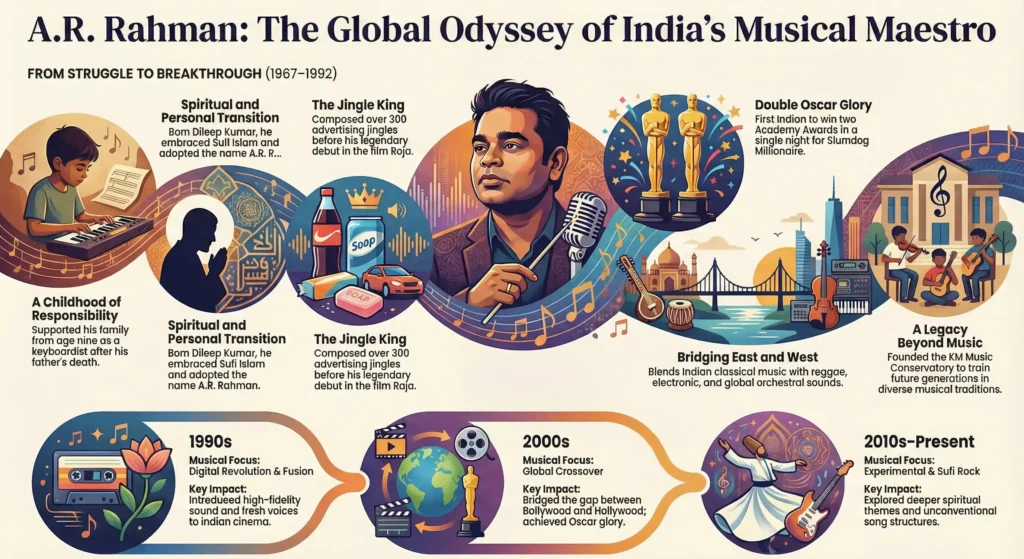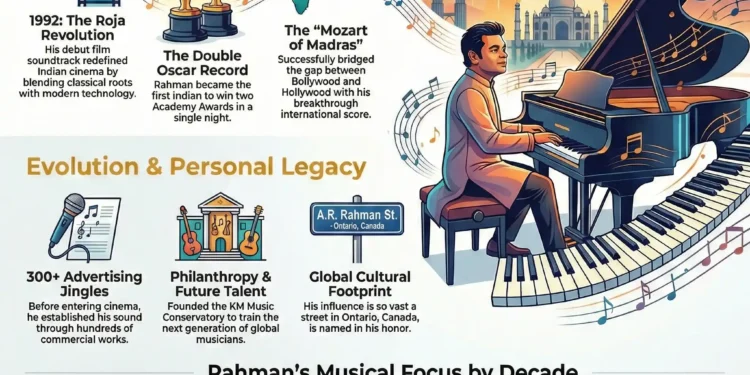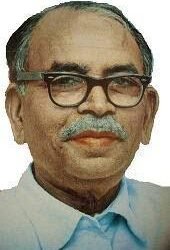A.R. Rahman, born A.S. Dileep Kumar in 1967, is a world-renowned Indian composer, singer, and philanthropist. After losing his father at the age of nine, he shouldered family responsibilities by playing in orchestras. His big break came in 1992 with Mani Ratnam's Roja, which revolutionized film music in India by blending classical roots with modern technology. Known for his spiritual depth and versatility, Rahman has won two Academy Awards (Oscars), two Grammys, and a Golden Globe. He is celebrated not just for his music but for his humility and humanitarian work.| Attribute | Details |
| Full Name | Allah Rakha Rahman (born A.S. Dileep Kumar) |
| Date of Birth | January 6, 1967 |
| Birthplace | Chennai, Tamil Nadu, India |
| Profession | Music Composer, Singer, Songwriter, Producer |
| Debut Film | Roja (1992) |
| Key Awards | 2 Academy Awards, 2 Grammy Awards, Golden Globe, BAFTA, Padma Bhushan |
| Spouse | Saira Banu (Married 1995) |
| Children | Khatija, Raheema, A.R. Ameen |
| Notable Works | Roja, Bombay, Dil Se.., Lagaan, Slumdog Millionaire, Rockstar |
Early Life: A Childhood of Responsibility

Born as A.S. Dileep Kumar in Chennai, Rahman was surrounded by music from birth; his father, R.K. Shekhar, was a composer for Malayalam films. However, tragedy struck when his father passed away when Rahman was just nine years old. Forced to support his family, the young prodigy began playing the keyboard for professional orchestras, often missing school. It was a childhood defined by struggle, but it laid the foundation for his mastery over multiple instruments. During this difficult period, his family found solace in Sufi Islam, leading to their conversion and his name change to Allah Rakha Rahman.
6 Unfoldings in the Subrahmanyan Chandrasekhar Biography
The Breakthrough: A New Sound for India
After years of composing jingles for advertisements, Rahman met director Mani Ratnam, a meeting that would change Indian cinema forever. His debut soundtrack for Roja (1992) was a revelation—it moved away from the standard orchestral sounds of the time to a fresh fusion of reggae, classical, and soft melodies. The album was a massive hit across India, earning him the National Film Award for Best Music Direction in his very first film.
Global Impact: The Mozart of Madras
Rahman’s music knows no language.
- Pan-Indian Success: He conquered Bollywood with hits like Rangeela (1995), Dil Se.. (1998), and Taal (1999), proving that a South Indian composer could rule the Hindi heartland.
- International Acclaim: His work on Andrew Lloyd Webber’s Bombay Dreams and the stage adaptation of The Lord of the Rings brought him to the West. However, it was Danny Boyle’s Slumdog Millionaire (2008) that catapulted him to global superstardom, winning him two Oscars (Best Original Score and Best Original Song for “Jai Ho”), a Golden Globe, and two Grammys.
- Evolution: From the raw energy of Rockstar (2011) to the epic grandeur of Ponniyin Selvan (2022), he continues to reinvent his sound.
Personal Life & Philanthropy
Despite his colossal fame, Rahman remains deeply grounded and spiritual. He married Saira Banu in 1995, and they have three children—Khatija, Raheema, and A.R. Ameen—who are also carving paths in music. He is a dedicated philanthropist, running the A.R. Rahman Foundation to help alleviate poverty and funding the KM Music Conservatory to train the next generation of musicians in both Western and Indian traditions.
10 Remarkable Facts About Meghnad Saha Life and Achievements
Quick Comparison: Eras of Innovation
| Era | Musical Focus | Key Albums | Impact |
| 1990s | Digital Revolution & Fusion | Roja, Bombay, Dil Se.. | Introduced high-fidelity sound and fresh voices to Indian cinema. |
| 2000s | Global Crossover | Lagaan, Slumdog Millionaire | Bridged the gap between Bollywood and Hollywood; Oscar glory. |
| 2010s-Present | Experimental & Sufi Rock | Rockstar, Highway, PS-1 | Explored deeper spiritual themes and unconventional song structures. |
Curious Indian Fast Facts
- The Name Change: He was born a Hindu with the name Dileep Kumar but converted to Islam in his 20s, adopting the name A.R. Rahman.
- Jingle King: Before films, he composed over 300 advertising jingles, including the famous Leo Coffee ad.
- Band Days: As a teenager, he played keyboard for a band called “Roots” with childhood friend Sivamani.
- The Oscar Record: He is the first Indian to win two Academy Awards in a single night.
- Street Name: A street in Markham, Ontario, Canada, is named “Allah-Rakha Rahman St” in his honor.
7 Incredible Facts in the Satyendra Nath Bose Biography
Conclusion
A.R. Rahman is not just a composer; he is a phenomenon who taught the world to listen to India with fresh ears. His journey from a boy struggling to make ends meet to standing on the Oscar stage is a testament to the power of faith and hard work. By staying true to his roots while embracing the world, Rahman has created a legacy that will resonate for generations, proving that music truly is the universal language of mankind.
8 Remarkable Secrets in the Jagadish Chandra Bose Biography
If you think you have remembered everything about this topic take this QUIZ
Results
#1. What was A.R. Rahman’s birth name before he adopted his current name?
#2. Which 1992 film marked A.R. Rahman’s debut as a music composer?
#3. For which film did A.R. Rahman win two Academy Awards (Oscars) in a single night?
#4. A street has been named “Allah-Rakha Rahman St” in his honor in which city?
#5. Before entering the film industry, what was A.R. Rahman’s primary work?
#6. What is the name of the music conservatory founded by A.R. Rahman?
#7. As a teenager, A.R. Rahman played the keyboard for a band called “Roots” with which childhood friend?
#8. A.R. Rahman won a National Film Award for Best Music Direction for his very first film. Which film was it?
What was A.R. Rahman’s first movie?
His debut film as a composer was the Tamil classic Roja (1992), directed by Mani Ratnam.
How many Oscars has A.R. Rahman won?
He has won two Academy Awards, both for the film Slumdog Millionaire (2009).
What is A.R. Rahman’s real name?
He was born A.S. Dileep Kumar. He changed his name to Allah Rakha Rahman after converting to Islam.
Does A.R. Rahman have a music school?
Yes, he founded the KM Music Conservatory in Chennai to provide world-class musical training to Indian students.
Who is A.R. Rahman’s wife?
He is married to Saira Banu.
Read More: https://curiousindian.in/madhuri-dixit-may-1967-present/








